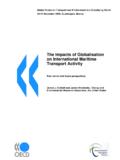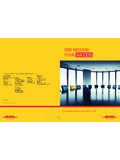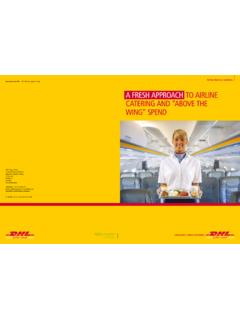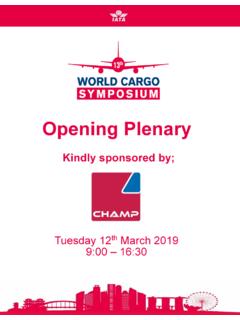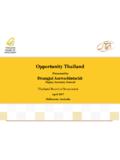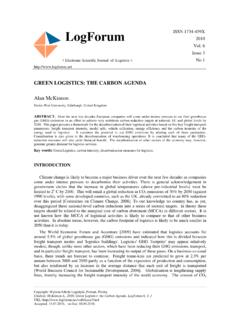Transcription of The Challenges of Trading Halal Food: The Logistics and ...
1 CHAPTER 15. The Challenges of Trading Halal food : The Logistics and the Law Introduction discriminatory legislation which could stigmatise religiously certified food products, thereby imposing The market for Halal consumer goods has grown at a impermissible trade barriers for those products. rapid rate over the past decade, with products that range from food to personal care. The global Halal food market alone is potentially worth USD580 However, the Halal food Logistics production and distribution of Halal food has created The Halal evolution a number of issues that are unique to domestic and international trade between Muslim and non-Muslim As Islam is a way of life, a philosophy, a religion and countries, as well as between different Muslim countries.
2 A belief system, it is rooted in a culture that is both Fundamentally, disputes on the transportation of Halal evolutionary and revolutionary,2 and it can then be food arise when there is the potential of distributing argued that Halal too goes through an evolution. food with non- Halal food . Logistics then becomes a When seeing Halal as an evolution, four phases can be religiously sensitive issue as Muslims would like to identified: Muslim company, Halal product, Halal supply ensure the integrity of their food . The purview of public chain, and Halal value chain. international law then becomes important to regulate the Halal food supply chain.
3 In the rst phase, Muslim company, the Halal supply chain is purely based on trust. A Muslim is buying This chapter explores the Logistics and the legal issues from another Muslim, and therefore the seller will be of transporting Halal food . Although current Halal responsible to God for ensuring that the food he/she standards regulate food production, preparation, is selling is Halal . In this way, the buyer has sufficient handling and storage to some degree, it does not ensure con dence that the food he/she is consuming is Halal . that the product is Halal at the point of consumption. In the second phase, Halal product, an important basis In particular, Halal Logistics capabilities are critical in for trust is the Halal certi cation behind this product ensuring the Halal integrity of the entire supply chain as shown as a label on the consumer product or outlet from farm to fork.
4 The management of Halal food supply (in case of a meat shop or restaurant). This Halal trust chains is therefore important in order to extend the mark provides assurance that the product, its source Halal integrity from source (where the product is Halal and facility have been veri ed by an independent 1 Imarat Consultants, An certified) to the point of consumer purchase (where the overview of the Global Islamic certi cation authority to be compliant with Halal Market, at http:// Muslim consumer buys the Halal product). Shari'a. In the third phase, Halal supply chain, the Halal trust mark provides assurance that the entire supply Research%20 Material/.
5 Presentations/overview%20 The chapter will then provide an overview of international chain is compliant with Shari'a, which is audited and of%20global%20halal%20 trade law and the status of Halal in the eyes of the law. It certi ed by an Islamic certi cation authority. In the will discuss how international trade law can be used as fourth phase, Halal value chain, Halal covers the entire 2 Wilson, (2012) a shield to allow individual governments to implement value chain. In this phase, Islamic food multinationals The new wave of Halal certification standards they deem necessary to control entire supply chains from seed to fork . Islamic transformational Islamic protect the integrity of the Halal supply chain.
6 Finally, science is important in ensuring high-performance marketing. Journal of Islamic Marketing, Vol. 3, No. 1, pp. it will provide a recent example of how international supply chains. Instead of current green movements 5-11. trade law can also be used as a sword to overcome that have the ambition of being environmental neutral, 172. the future Halal value chain will create value, value for the supply chain, carbon footprint and resources the community as well as the Earth. Although most countries are in phase 1 or 2, Malaysia and Brunei have Efficiency made a lot of progress in addressing the importance of Halal Logistics and have entered the third phase.
7 There Efficiency of Halal supply chains is important to ensure are no countries yet that have entered the phase of the low costs and high accessibility of Halal food products Halal value chain. to (Muslim) consumers. Problems in this would result in hardship for Muslim consumers in having access to affordable Halal food , which would especially affect Characteristics of Halal food Muslims living in non-Muslim countries. Important key performance indicators for efficiency are supply chain supply chains (management) costs, utilisation of Halal storage facilities, utilisation of Halal Today's food chains are complex, consisting of a great diversity of processed and natural ingredients and additives that are sourced from countries, both Muslim The vulnerability of Halal food supply chains, the large and non-Muslim.
8 Halal requirements add another size and growth of the Halal market, and more stringent complexity, particularly as there are differences in Halal requirements in Halal through regulations force brand requirements, Halal standards and certification between owners to extend Halal towards Logistics and supply countries. This difference is due to, first of all, the chain management in order to protect their brand and complexity of the Halal markets, which are shaped by deliver their promise to the Muslim consumer. Islamic schools of legal thought, local fatwas (religious rulings) and local customs. Second, Halal is generally not Halal Logistics regulated in non-Muslim countries as well as in many In developing robust, effective and efficient Halal food Muslim countries, leading to a lack of enforcement on supply chains, Logistics plays a key role in extending the the use of Halal logos.
9 Halal integrity from source to the point of consumer purchase. The foundation of a Halal Logistics system Halal food supply chains are vulnerable as they are is a robust policy, which confirms the intention and based on trust, the maintenance of Halal integrity commitment of the company in establishing a Halal throughout the supply chain, avoiding doubt in the Logistics /supply chain management system. Amongst authenticity of Halal food , control of Halal food norms others, a Halal policy addresses: the responsibility of and sensitivity of the Muslim consumer towards Halal . an organisation in protecting the Halal integrity along The result is that Halal food supply chains need to, firstly, the supply chain; the scope of Halal certi cation of be robust in order to minimise the impact of a possible the organisation; the assurance to the consumer.
10 Contamination. Secondly, Halal supply chains need to and methods of assurance (control mechanisms be effective in ensuring the integrity at each link in the covering aspects like Halal monitoring committee, Halal chain. Thirdly, Halal supply chains need to be efficient compliance officer and inspections). in order to avoid higher prices for Halal food products. Key components of a Halal Logistics system are Robustness warehousing, transportation and terminal operations. The foundation of a Halal Logistics system is based on A robust Halal supply chain is capable of protecting the three fundamentals: avoid direct contact with haram Halal product from contamination under all plausible (cross-contamination), avoid risk of contamination based scenarios.
